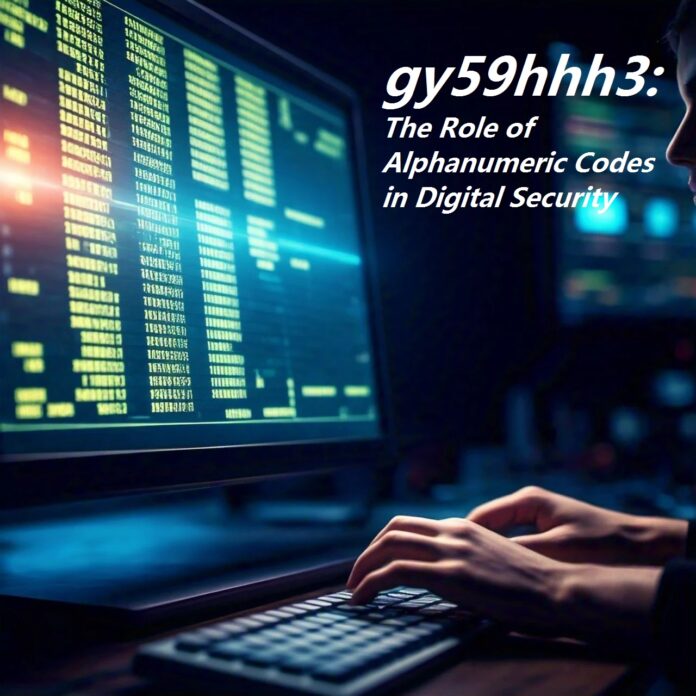gy59hhh3 – In today’s increasingly digitalized world, a great deal of emphasis is placed on numerals and letters that are used for maintaining security, organizing data and ensuring smooth running communication. The codes such as “gy59hhh3” illustrates the importance of unique combinations of numbers and letters within digital security systems across industries.
This article covers why alphanumeric code should be given attention; it’s usefulness in tackling problems; moreover, how important they have become in protecting modern digital spaces.
What are Alphanumeric Codes?
Alphanumeric codes consist of letter (both lower case and upper case alphabets ranging from A to Z) and numbers (0-9) combined together to form unique identifiers. They are frequently used for matters touching on safety, authentication or organization. Unlike pure numeral based codes or alphabetical strings, alphanumeric codes provide a broader spectrum of combinations thereby making them more complicated and useful. In this regard, “gy59hhh3” is an example of a code whose unpredictability makes it highly valuable under different security protocols.
Why Alphanumeric Codes Like gy59hhh3 Matter
1. Why They Are Important in Security Matters
Alphanumeric codes are critical to enhancing security. As cyber threats continue to rise, having a strong system of data protection is necessary. By creating combinations that are hard to guess or crack, alphanumeric codes make unauthorized access more difficult. For instance, “gy59hhh3” is more unpredictable than a simple numeric code like “123456.” This adds an element of security against brute force attacks as well as unauthorized entries.
2. The Role of Alphanumeric Codes in Enhancing Authentication
Alphanumeric codes are commonly employed for authentication purposes such as password systems, verification codes, and security tokens. These codes ensure that only authorized users get into sensitive systems, platforms or information sources. Letters and numbers integrated in codes such as “gy59hhh3” reduce the possibility of replication and thus improve the integrity of the overall system.
3. How Algorithms Facilitate Organizational Processes
Apart from just boosting security processes alphanumeric codes play an immense part in organization at large. Businesses use them to label goods, follow up on their inventory status and even record keeping. Unique features associated with such orders like “gy59hhh3” lead to precise identification thereby reducing errors in handling data while enhancing work efficiency
Applications of Alphanumeric Codes in Digital Security
1. Passwords and Passcodes
One common use of alphanumeric codes is the generation of passwords and passcodes. A strong password often consists of a mix of capital letters, small letters, numerals and sometimes special characters. Such codes as “gy59hhh3” are excellent examples that strike balance between complexity and ease to remember.
2. Two-Factor Authentication (2FA)
In two-factor authentication systems, alphanumeric codes are commonly employed as the second layer for verification purposes. For example, someone might receive an email or SMS containing a code such as “gy59hhh3,” after typing in their primary password. This ensures that even if the primary password is compromised, unauthorized access is still prevented.
3. Encryption Keys
During transmission, encryption is vital in safeguarding data. Often, alphanumeric codes serve as encryption keys to ensure that information remains secure when locked or unlocked. For example, “gy59hhh3” may be used as an identifier for encryption algorithms which make sure that data cannot be intercepted or altered.
4. Secure File Sharing
Various file-sharing platforms generate unique links or access keys based on alphanumeric codes. Consequently, a code like “gy59hhh3” could be required before one downloads a file or views its contents guaranteeing the confidentiality of information by allowing only authorized users to have access on it.
5. Access Control Systems
Access control systems depend heavily on alphabets and letters which enable them to have both physical entry points and digital platforms. Alphanumeric codes are used as gatekeepers for secure enforcement or access to a restricted software system like “gy59hhh3” in that only authorized users are allowed.
Challenges of Using Alphanumeric Codes
Alphanumeric code usage also poses challenges such as:
- User Memorability: The code “gy59hhh3” may not be remembered by many users, resulting in its being written down unsafely or applied across platforms.
- Phishing Attacks: Cybercriminals often prey on such characters by means of phishing emails or counterfeit websites.
- Management Complexity: Having many unique alphanumeric codes to handle and maintain can be difficult in the absence of proper tools and systems in organizations.
Proper Usage of Alphanumeric Codes for Digital Security
1. Create Strong Unique Codes
The more unpredictable and long those alphanumeric codes become the better; thus, avoid using patterns that anyone can easily guess like password123 or abc1234 for instance. Therefore, having random complex characters like gy59hhh3 is best practice.
2. Keep Updating Codes Regularly
Periodic changes of alphanumeric codes ensure that its compromise is minimized. Develop systems that require users to change their codes regularly.
3. Use Password Management Tools
For people who struggle to remember many alphanumeric codes, password management tools provide a secure way of storing and recovering them when needed.
4. Enforce Multi-Factor Authentication (MFA)
Improve the security of alphanumeric codes by incorporating them into MFA systems which add an extra layer of verification making it harder for attackers to gain access.
5. Educate Users about Security Practices
Train users on why they should use alphanumeric passwords and how to protect them from risks like social engineering and phishing attacks.
Future of Alphanumeric Codes
Going forward in the course of technological development, alphanumeric codes will have increasingly more relevance to digital security. Furthermore, artificial intelligence (AI) and blockchains are expected to both integrate more with these systems as well as make them better. For example, AI based algorithms can generate highly secure real time algorithms such as “gy59hhh3” while blockchain systems can make use of those codes for secure transactions as well as data validation.
Moreover, as the adoption of Internet of Things (IoT) becomes more prevalent, alphanumeric codes will be important for managing and safeguarding interconnected systems. In order to ensure that only authorized entities interact with these technologies, unique codes need to be used in everything from smart home devices to industrial machinery.
Conclusion
Alphanumeric codes such as “gy59hhh3” are vital to digital security. They help protect sensitive data, verify users’ identities and organize systems. Best practices can be applied and new technologies adopted to mitigate the issues around such codes hence ensuring their continuous use in keeping our digital future secure.
FAQs about gy59hhh3 and Alphanumeric Codes
Q1: What makes alphanumeric codes like gy59hhh3 secure?
A1: A combination of numbers and letters makes it possible for them to have a large number of different combinations which gives them great complexity thereby making them difficult to guess or crack thus increasing security levels.
Q2: How are alphanumeric codes used in two-factor authentication?
A2: Two-factor authentication requires users to enter an additional code such as “gy59hhh3” sent via email or phone number so that it confirms who they are.
Q3: Can alphanumeric codes be recycled across platforms?
A3: Reusing alphanumeric codes is not a good idea across platforms because it increases the likelihood of security breaches. Each platform should have its own code.
Q4: What solutions can manage multiple alpha-numeric codes?
A4: Password managers are great tools that securely store and organize multiple alpha-numeric codes, making them easily accessible without risking security.
Q5: How do I make a strong alphanumerical code?
A5: To make it strong, the code must be at least 8-12 characters long, must contain both uppercase and lowercase letters, numbers and also shouldn’t have easily detectable patterns like for example in “gy59hhh3,” which can serve as a good example of a solid alpha-numeric code.


